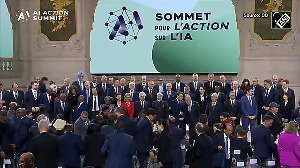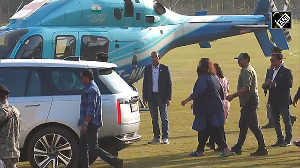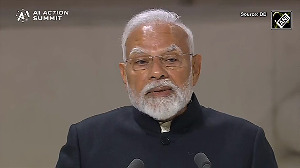In the continuing tug-of-war over the latest Doha draft modalities (parameters) text on how to liberalise industrial goods, India, along with South Africa and other developing countries, on Monday crossed swords with the United States and the European Union at the World Trade Organisation.
India's trade envoy, Ambassador Ujal Singh Bhatia, issued a strong notice that if there is no third revised text which fully addresses the grave lacunae as well as developmental deficiencies in the latest draft, it would be difficult for members to enter into horizontal meetings that WTO chief Pascal Lamy wants to convene next month.
The horizontal meetings are expected to fine-tune the tradeoffs between agriculture and non-agriculture market access (Nama) commitments.
Bhatia said the latest draft failed to live up to the Doha mandate on how to secure more market access for developing countries. He cited four core principles -- less-than-full reciprocity, the need to reduce tariffs from bound tariffs, flexibilities for developing countries, and comparability between the outcomes of Nama and agriculture negotiations -- on which the latest draft fell well short of expectations.
"We remain concerned about the numbers in your draft," India told the chair, arguing that "the present numbers remain too far from meeting the basic requirement of the mandate, namely LTFR (less-than-full-reciprocity, under which industrialised countries are required to take bigger commitments than developing countries)."
South Africa echoed a similar position saying the Nama-11 coalition, in which India, Argentina, Brazil and other developing countries are members, is unable to agree with the chair's latest draft text.
The chair, Ambassador Don Stephenson, told journalists that while he was aware of the concerns raised by Indian and other Nama members, it was up to members at large to negotiate and come out with proposals to improve his text.
In sharp contrast to the opposition from developing countries that the latest draft turned its back to their proposals, the United States threatened that there would not be any Doha deal if there was no real market access, especially in big emerging countries.
The US, which has come under considerable criticism over its latest Farm Bill (which intends to provide over $300 billion farm subsidies), is using the Nama and the latest draft texts to shift the blame on developing countries, according to an Asian trade negotiator.
"Clearly, the US is attempting to put the blame for the failure of the Doha trade negotiations on developing countries, saying there is not much for it in the Nama text while, in reality, it is not in a position to deliver on anything at this juncture in the Doha trade negotiations because of the recent Farm Bill, which has made a mockery of what is being negotiated at the WTO," said the Asian trade negotiator, who preferred to remain anonymous.
The European Union also charged the chair with providing too many flexibilities for developing countries in the latest draft text, arguing there was an increased imbalance, mostly because of the expanding range of coefficients and flexibilities.
Significantly, developing countries led by India and South Africa on one side and the US and the EU on the other pulled the draft text in opposite directions, trade negotiators said.
While developing countries are unhappy that their core proposals were not adequately reflected in the draft text, the rich countries maintained that the text provided too many flexibilities, negotiators added.







 © 2025
© 2025